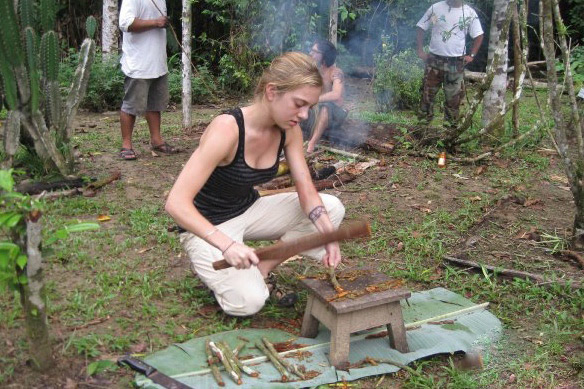Cannabis and yoga are very trendy at the moment and it’s not hard to find a yoga class in marijuana-legal states that in some way incorporates cannabis use.
But the tradition of cannabis and yoga actually goes back centuries, according to Rachael Carlevale, founder of the Colorado-based Ganjasana yoga system.
“If we look at the roots of yoga practice you can see that ganja was a part of that,” she says during a telephone interview with The Cannabist. “In India you see the Sadhus (Hindu holy men) sitting in meditation; they are smoking ganja. And if you look at the ancient Vedic texts there is evidence that they used a (cannabis) drink called bhang, for example.”
Ganjasana is a combination of ganja, a word with Sanskrit roots that’s now universally used for cannabis, with asana, another Sanskrit word that describes yoga postures. Carlevale describes her system as a blending as well; what she calls a “conscious pairing of regenerative cannabis plant medicine with the practices of yoga, meditation and mindfulness.”
The 29-year-old Carlevale has been involved with both cannabis and yoga for more than half her life. And those two passions ended up combining in unexpected ways.
“When I started practicing yoga as a teen, I was also using cannabis,” she says. “It was really something that came together for me, gave me a sense of purpose in this world.”
And her world at the time was disciplined and purpose-driven. A native of coastal Massachusetts, Carlevale performed with the Boston Ballet and while at the University of Massachusetts-Amherst was pre-med with a biology concentration, studying plant and soil sciences. “It was all about getting good grades, serving the world, wanting to become a good doctor,” she recalls.
But then she decided to go on a different path. She spent part her senior year doing plant studies with the Shipibo, an indigenous tribe of the Peruvian Amazon. During that time she was introduced by local shamen to another psychoactive plant, ayahuasca, although she didn’t try it personally until later.
After returning to Massachusetts and graduating in 2010, Carlevale decided to obtain her yoga certification instead of going forward with a medical degree.
“I saw that to be my path as a healer,” she said in an email from Costa Rica, where she was teaching at a yoga retreat.
 Rachael Carlevale studied plant medicine in Peru with the Shipibo, an indigenous tribe. (Courtesy of Rachael Carlevale)
Rachael Carlevale studied plant medicine in Peru with the Shipibo, an indigenous tribe. (Courtesy of Rachael Carlevale)
She soon moved West with the man who would become her husband and settled in southwest Colorado, “where the laws suited our needs” to legally grow organic cannabis, she says.
Around that time she was also diagnosed with uterine cancer. Living at altitude in Colorado’s high country, she became severely anemic and ended up in a hospital emergency room. It took several months of tests with traditional doctors, she says, before they came up with the proper diagnosis.
But rather than proceed with a doctor-recommended hysterectomy, Carlevale chose to forego conventional treatments.
“I worked with a naturopathic doctor in Durango, who supported natural plant medicine,” she said.
Along with that doctor she developed a health plan with a team of specialists in acupuncture, kinesiology and nutrition.
“I also worked with my professor who brought me back to Peru for an ayahuasca ceremony,” she adds. “I had quite the dream team of support, and am forever grateful that I canceled that surgery appointment.”
Her tumor, she says, has shrunk down to a fraction of its original size.
During the time she spent working to heal herself, she also began to put together what would become Ganjasana.
“I ran two years of pilot studies,” she says. “With my educational background I always like to make sure that the programs are actually being effective and efficient. I did clinical studies; tested different cultivars and strains to see what would really work for one and doesn’t work for another.”
Ganjasana, she says, became part of a mission: “to help people build a relationship with the plant medicine.”
Before her Colorado classes, or “ceremonies” as she calls them, Carlevale requires her students to show up sober and with clear, open minds. For the class she supplies the cannabis, which she says is pesticide-free and grown as part of a philosophy of a regenerative, living soil system. She favors two particular strains: The White, a “heavy indica that I like to use in ceremonies,” and a hybrid called Holy Headband.
The class begins with some breath-work. Students then consume cannabis before going through different asanas. But rather than cannabis elevating the yoga, Rachael says it’s the yoga that creates an elevated experience: one that expands concentration and develops “mindfulness,” the mental state of being aware of the present moment in a non-judgmental way.
“What we’ve seen as cannabis legalizes around the U.S. is a big understanding of how to use plant medicine mindfully,” she says.
Carlevale is working to expand access to her Ganjasana program outside of her home state, via a series of online classes, hosted by Green Flower. She also has plans to set up a school to train people in her system.
Carlevale says she’s used to skepticism when it comes to the concept of cannabis yoga. But she wants the skeptics to know that “there is science behind this, in that cannabis is a true medicine. I like to admit that this plant has literally saved my life. So we’re really passionate about letting everyone know that. No matter what you think, this plant heals.”
“I definitely don’t take credit for combining the practice of yoga with cannabis,” she adds, “but I would say that it’s an ancient practice that’s just starting to come back to modern times.”
